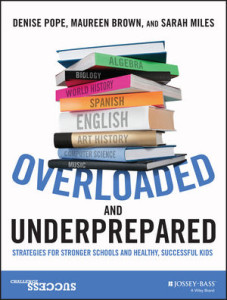 Many middle and high school students are exhausted, stressed, tempted by maladaptive behaviors, and not necessarily optimally prepared for adulthood. Challenge Success is an organization that addresses these issues by advising schools about best practices for improving learning, supporting social emotional development, and fostering students’ long-term success. In Overloaded and Underprepared: Strategies for Stronger Schools and Healthy, Successful Kids Denise Pope, Maureen Brown, and Sarah Miles synthesize a decade of experience as leaders of Challenge Success and recent educational research about student learning and engagement. The result is a clear and practical guide for parents and educators interested in changing their school cultures to promote more holistic, ethical, creative, and analytic development in students.
Many middle and high school students are exhausted, stressed, tempted by maladaptive behaviors, and not necessarily optimally prepared for adulthood. Challenge Success is an organization that addresses these issues by advising schools about best practices for improving learning, supporting social emotional development, and fostering students’ long-term success. In Overloaded and Underprepared: Strategies for Stronger Schools and Healthy, Successful Kids Denise Pope, Maureen Brown, and Sarah Miles synthesize a decade of experience as leaders of Challenge Success and recent educational research about student learning and engagement. The result is a clear and practical guide for parents and educators interested in changing their school cultures to promote more holistic, ethical, creative, and analytic development in students.
Pope, Brown, and Miles outline the elements of a process for changing a school’s culture. Reform comes about when all stakeholders (i.e., school administrators, staff members, faculty, parents, and students) collaborate and listen to one another to identify knotty problems, understand their root cause, and work together towards solutions. Impending changes should be communicated clearly to all parties and changes should be made incrementally.
The authors summarize their recommended changes with the acronym SPACE. That is, reformers can consider: (s) students’ schedule and use of time; (p) project- and problem-based learning; (a) alternative and authentic assessment; (c) creating a climate of care; and (e) education not only for students but for parents and faculty too.
With regard to scheduling, the authors suggest that the school day be restructured to start later thereby aligning with adolescents’ natural circadian rhythm. They urge more breaks in the day for reflection and socializing and a block schedule in which classes have longer but fewer meetings to facilitate deep learning. They suggest also that the school calendar be adjusted so that semester exams occur before winter break to make the vacation more restful.
A major contributor to students’ exhaustion is heavy homework loads. In high preforming schools teenagers spend about three hours per night on homework. However, the vast majority of students do not think that their homework is helpful. Indeed the authors argue that homework is not necessary for a rigorous curriculum or for developing a strong work ethic. Given the contribution homework makes to students’ stress and academic disengagement, it should only be used to review skills or prepare for in-class activities. Further, worthwhile homework allows for student choice, is tailored to each students’ skill level, and connects to the overarching concepts in the course.
Pope, Brown, and Miles argue that maintaining student engagement—their excitement about school, their willingness to put effort into their work, and their belief that school is worthwhile—is essential for maintaining physical and mental health and reducing cheating. Project-based learning (PBL), in which students have a driving question that they try (often for a couple weeks) to answer, can improve engagement.
Testing, especially when it is based heavily on memorization, is another contributor to student stress. The authors reconceptualize assessment as a montage of frequent and diverse forms of measuring progress and showing a students’ full range of abilities. Teachers can create this montage by including assessments in which students must apply knowledge to real world problems, allowing for self-assessment, and providing feedback to students with the opportunity for revision.
Well over two million students took Advanced Placement (AP) exams in 2013. Pope, Brown, and Miles, however, urge caution before adopting an AP curriculum and they suggest critical examination of existing AP programs. They recommend considering the cost of the program and the risk of teaching to an imperfect test. If AP programs are adopted, they should be part of a larger reform effort and available to all students. The authors state that AP programs do not make students better prepared for college or more likely to gain admission. Additionally, they are not an efficacious way to close achievement gaps.
The authors conclude with several recommendations for overall wellness. Schools with a “climate of care” seek to promote social emotional learning, a sense of belonging, healthy relations with teachers, and opportunities for counseling. They teach stress-relief practices to students and teachers, promote an integrative, mind-body wellness and fitness routine, and recognize that wellness need not come at the expense of academic excellence. Schools and parents should work together to protect students’ time for play, day dreaming, and family.
As many Challenge Success schools have shown, when everyone affiliated with a school works together to identify why students are overworked and underprepared and when they are willing to consider the reforms to school policies outlined above, it is possible for students to have both a more rigorous academic experience and a more balanced life.
Pope, D., Brown, M., & Miles, S. (2015). Overloaded and Underprepared: Strategies for Stronger Schools and Healthy, Successful Kids. San Francisco, CA: John Wiley & Sons.

